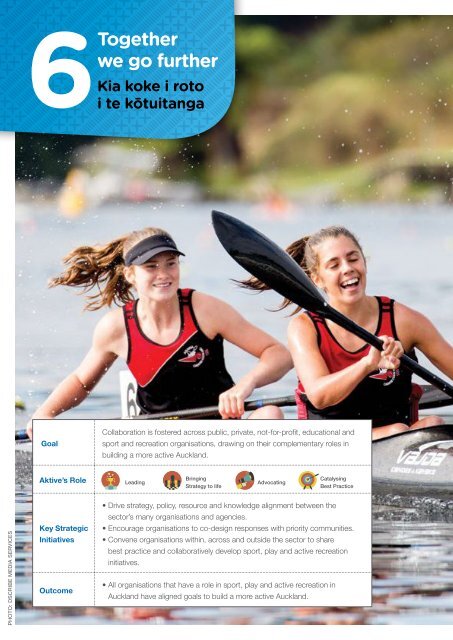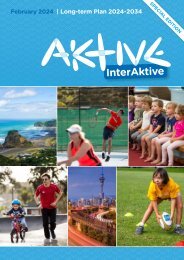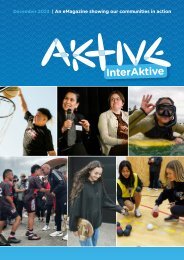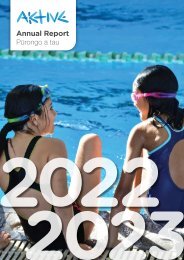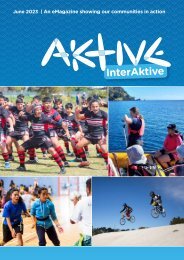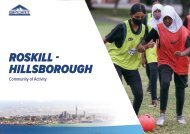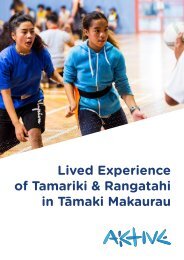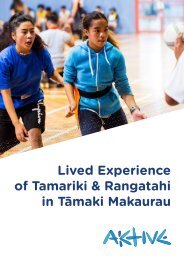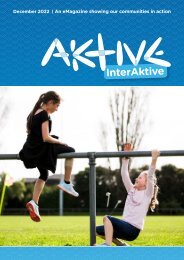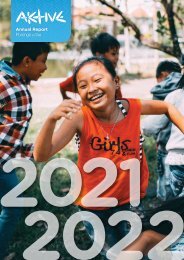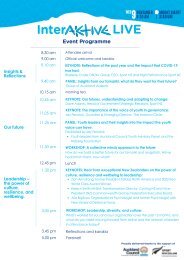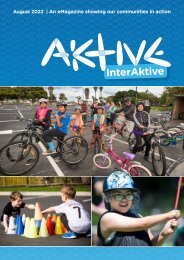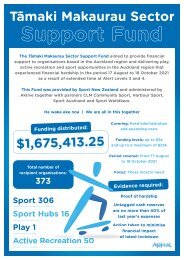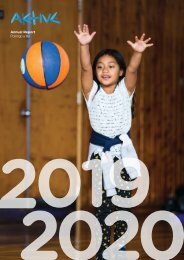Aktive's Strategic Framework 2020-2040
You also want an ePaper? Increase the reach of your titles
YUMPU automatically turns print PDFs into web optimized ePapers that Google loves.
PHOTO: DSCRIBE MEDIA SERVICES<br />
Goal<br />
Aktive’s Role<br />
Key <strong>Strategic</strong><br />
Initiatives<br />
Outcome<br />
Together<br />
we go further<br />
Kia koke i roto<br />
6i te kōtuitanga<br />
Collaboration is fostered across public, private, not-for-profit, educational and<br />
sport and recreation organisations, drawing on their complementary roles in<br />
building a more active Auckland.<br />
Leading<br />
• Drive strategy, policy, resource and knowledge alignment between the<br />
sector’s many organisations and agencies.<br />
• Encourage organisations to co-design responses with priority communities.<br />
• Convene organisations within, across and outside the sector to share<br />
best practice and collaboratively develop sport, play and active recreation<br />
initiatives.<br />
Bringing<br />
Strategy to life<br />
Advocating<br />
• All organisations that have a role in sport, play and active recreation in<br />
Auckland have aligned goals to build a more active Auckland.<br />
Catalysing<br />
Best Practice<br />
If Auckland is to become the world’s<br />
most active city, we will need to find<br />
new ways to work together to inspire<br />
all Aucklanders to be physically<br />
active as a regular part of their daily<br />
lives. Aktive has a pivotal role to<br />
play in bringing a wide range<br />
of people, communities and<br />
organisations together, to develop<br />
new and shared ways of working<br />
and to create alignment across<br />
the sector.<br />
Developing true collaboration<br />
between a wide range of<br />
organisations requires a culture of<br />
inclusion, trust and respect, based<br />
on an understanding of the changing<br />
nature of Auckland and its<br />
communities. For example,<br />
strengthening our relationships with<br />
Pacific communities recognises that<br />
Auckland has the largest population<br />
of Pacific peoples of any city in the<br />
world. We also will need to<br />
strengthen our connections with<br />
Auckland’s fast-growing Asian<br />
population. We need to work<br />
collaboratively with all priority<br />
populations to understand their<br />
interests and perspectives and to<br />
empower them to develop and lead<br />
initiatives.<br />
We will work closely with the<br />
many public, private and communitybased<br />
organisations that have<br />
complementary roles to play in<br />
increasing participation in sport, play<br />
and active recreation in Tāmaki<br />
Makaurau, as well as encouraging<br />
Aucklanders to become more<br />
physically active. These include:<br />
• Sport New Zealand<br />
• Auckland Council and its agencies<br />
(such as Auckland Transport and<br />
Auckland Tourism, Events, and<br />
Economic Development)<br />
• Central government agencies<br />
(including the sport, education and<br />
health sectors)<br />
• Regional sports trusts<br />
• National and regional sporting<br />
organisations<br />
• Iwi/Māori and ethnic development<br />
organisations<br />
• Education providers (early<br />
childhood, schools, and tertiary<br />
providers)<br />
• Health providers<br />
• Community-based and not-forprofit<br />
organisations<br />
• Private sector sport and recreation<br />
organisations<br />
• Private corporations and<br />
workplaces.<br />
We will all have to work together<br />
to make the best use of our time,<br />
knowledge and resources, drawing<br />
on our complementary strengths<br />
to produce better outcomes.<br />
This could mean for example:<br />
• Working with schools to provide<br />
access to their sport and<br />
recreational facilities outside<br />
school hours<br />
• Working with corporates to be<br />
more expansive in the benefits<br />
they offer employees, such as gym<br />
memberships, sports leave for<br />
players and officials, funding of<br />
recreational activities, and<br />
encouraging walking and cycling<br />
as a part of the working day<br />
• Encouraging public and private<br />
organisations to leverage more<br />
opportunities for activity by being<br />
innovative in how they use their<br />
facilities<br />
• Sharing knowledge and ideas with<br />
the health sector on proven<br />
programmes and initiatives that<br />
encourage people to become<br />
more active.


